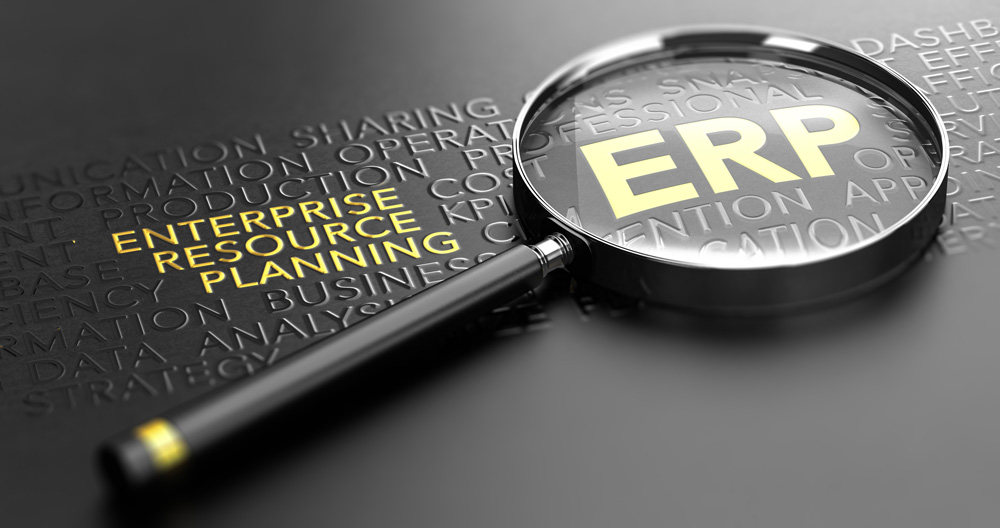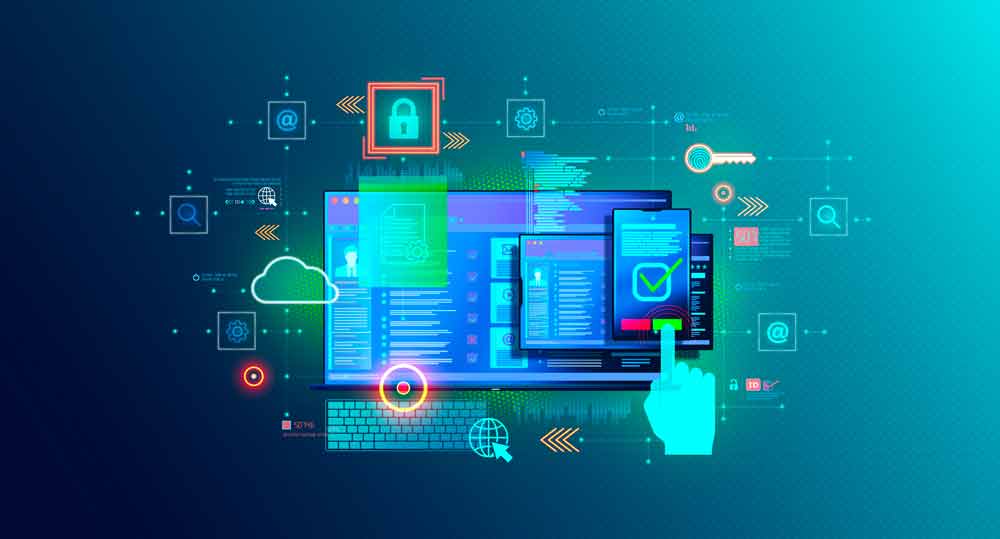Tabella dei contenuti
In the age of computerization it is unthinkable that a company can continue to use only a management system and not evaluate instead of buying an ERP application for the optimization of all organizational processes without waste or errors of any kind. But what is meant by corporate ERP and why can it be considered the new management system that every company should have? In order to understand what ERP systems are, it is necessary to give a definition and make an example of them. Furthermore, in this article we will deepen the differences compared to the traditional management software and we will see which are the best Italian ERPs.
Corporate ERP: the definition of the new management system for your company
The ERP management system is the “IT backbone” of a company that allows you to plan and coordinate each resource and ensures that the flow of materials and information is always continuous. In other words: the ERP management system is the ERP software system used to manage all the activities of a company, from accounting to risk management, from project management to human resource management, with the aim of planning, quantifying and forecasting some actions to avoid errors. In fact, the collection of data comes from different sources but thanks to the management ERP any duplication of data is eliminated, so as to have only a database of precise information. ERP management systems are therefore essential for companies that really want to make their business processes more efficient.
The ERP methodology: how the management process works
In fact, ERP management systems centralize the data of the various company areas and optimize them so that there is integration between all business lines, with a view to maximum operational efficiency, with no margin for error. The coordination of each process, obtained thanks to a company ERP system which removes the misalignment of upstream information, allows for having a single database shared within the company which is updated in real time every time a user of a department performs an operation of the workflow. Basically corporate ERP systems allow you to manage the modules of an organization according to needs. That is, you can start first with the essential ones (management control, accounting and administration, personnel, warehouse and production management) and then gradually decide whether and which other modules to integrate (such as sales or distribution management, plant maintenance).
How to choose a corporate ERP: the aspects to evaluate
Choosing to buy one of the ERP management systems for your business is not easy. In fact, various aspects must be considered, such as:
- manage user licenses
- face the difficulties of the individual company of abandoning the internal management system that has always been used to integrate a complete ERP system
- reorganize your plant and the management of each process
- prepare a hardware and software architecture suitable for an ERP infrastructure, such as having a central server, backup systems
- predict the costs of the ERP management software as well as the related maintenance and updating costs of the server, operating system and database. In this sense, the option of an ERP management system in the cloud is optimal, as we will see in the next paragraph
Why it is better to choose a cloud ERP
Choosing to buy an ERP in the cloud is much more convenient because it allows you to control and coordinate the various company processes by allowing all users who have access to the database to connect both in the office and remotely, with any device. Furthermore, it allows you to save on the purchase of data center resources and solve the problem of the data storage limit, as it would only be enough to modify the contractual agreements to have an unlimited number of users connected to the “virtual machine”. On the client side, then, access to the information to be shared is facilitated.
The 5 best Italian ERPs on the market
After having seen what ERP systems are, having ascertained how convenient and advantageous they are, having analyzed the process of creating a management system from scratch, all that remains is to briefly mention which are the best Italian ERPs:
- Epicor which allows you to manage all company activities by also integrating the software used in the office, including sales
- Acumatica, which tracks each item of inventory for the purpose of extrapolating precise data that the company can transform into a useful report for monitoring performance
- SAP, one of the most famous, which simplifies the processes of every company so much as to be a true ally for those who have to manage customer relations, from inventory to individual financial applications
- Oracle, the ERP for companies that need a management system for profit planning, resource managementwho and analysis of tax reports
- Teamsystem, the best known Italian ERP on the market, which provides customers with a suite of products in line with the needs of each company, from logistics to production, from sales to purchases and accounting.
Management software vs ERP, the differences
At this point it is necessary to dwell on the differences between management software and ERP systems to understand their usefulness. That is, a management software can only collect and finalize all the information coming from the individual management areas while the company ERP systems control, manage the information and propose certain actions based on the flow. These are two different management methods and only the company, based on its needs, will be able to decide whether it is better to choose one or the other. Let’s take an example of ERP to clarify the concept: within a company, an ERP system could propose which products to buy, when to buy them, from which suppliers, when to launch them, taking into account data analysis. In short, compared to the classic management system, an ERP allows you to:
- customize the various functions of the system according to the needs of the company
- monitor and organize workflows in real time
- improve the efficiency of the business process
- process data transforming them into useful information for corporate business plans
- integrate each function into a single management system
All this translates into 3 great advantages offered by an ERP system:
- integration between business processes with maximization of control of each work-flow
- reduction of duplications and optimization of sharing and coordination between the various company areas according to a project of maximum information transparency
- enhancement of internal management by monitoring the progress of each area of the company only from a centralized dashboard that can be accessed by company operators using a fixed or mobile device
When it is useful to have a personalized management system created for your company
In truth, a company shouldn’t ask itself the question of whether or not it should use management software, but rather which one to use. Yes, because if it is true that on the market, as mentioned above, there are functional management systems that satisfy the various needs of individual companies, it is also true that a company could consider developing an internal management system or request a customized one. This would first of all mean a unique made-to-measure product, which no one else, not even competitors, could ever have identical. But that’s not all, having a management system created from scratch implies:
- have a software solution adaptable to the needs of your company. Starting from the management problems that only you will be able to know based on your activity, you will be able to outline which modules are necessary to compose the functional management system for your work. And this implies that you won’t have to learn anything new but only continue to carry out your duties but optimizing some phases of the process, organizing them in the best possible way. In other words: you won’t have to “adapt” to using a new tool because it will already be adapted to what you do
- save time in managing activities, such as reducing the more cumbersome or manual steps, consequently increasing the speed and efficiency of individual operations
- make any necessary changes that may arise during use. So if you have a customized management system, you can decide, in agreement with the developers, when and how to modify it
- enhance the management by gradually adding new functions step by step as the company’s activity also grows, so as to adapt it to new and eventual business needs.
How to create a management system from scratch
But what needs to be done concretely to create a management system from scratch? First of all, you need to rely on a digital agency and analyze the workflow of your business, that is, understand how the process is structured so as to be able to design a management system that manages all the individual phases. A workflow tends to develop in 3 main phases:
- the repetition of certain operations to achieve certain results
- the division of responsibilities among operators
- the adoption of a common method among all employees
So only once the company flow has been defined can one actually move on to the creation of the management system with a view to simplifying the process and greater functionality. The following characteristics must also be taken into account when designing the management system:
- maximum flexibility in activity planning and project management so that project managers can define and assign each task, establish their priorities and deadlines
- ability to share documents, files, calendars, contacts and anything else that may be needed between u members no team
- track the time spent on a given operation in order to estimate the cost of business productivity and at the same time verify where action can be taken to improve it
- produce reports on progress and successfully completed projects
In short, the management system must become the company tool for optimizing times, improving the efficiency of each department, reducing errors and simplifying the most complex jobs, but also monitoring the results that are being obtained: a fundamental first step for an evolution in modern and dynamic corporate ERP logics.








